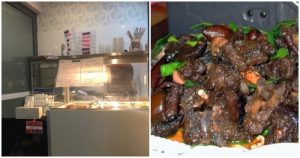John Flint of PerthNow reports Indonesian prawns sold to consumers in Australia contained trace elements of cooling water from a nuclear power plant, forensic tests uncovered.
 Dr John Watling, chief scientist with TSW Analytical, was surprised by the discovery, but believes food fraud is commonplace.
Dr John Watling, chief scientist with TSW Analytical, was surprised by the discovery, but believes food fraud is commonplace.
Dr Watling, formerly Winthrop Professor of Forensic and Analytical Chemistry at the University of WA, estimates that one-third of what we put in our shopping trolleys isn’t what it claims to be.
“With the Indonesian prawns, some exhibited the elemental signature of having been grown in the cooling water from a nuclear power station,” Dr Watling told The Sunday Times this week. “As there isn’t a nuclear power station in Indonesia they obviously didn’t come from Indonesia.
“The prawns were not toxic — we’re not talking about prawns that glow in the dark. But their elemental fingerprint indicated that they were not grown where the label said they were.”
Food fraud is so lucrative that organised crime syndicates are now involved, TSW Analytical’s chief executive Cameron Scadding says.
Mr Scadding, also a forensic chemist, said the explosion in demand for healthy and ethically produced foods is also being exploited.
The booming industry around expensive organic produce is expected to exceed $US100 billion this year. It’s hardly a surprise then, Mr Scadding said, to see cheaply produced foods passed off as organic.
“Given the premium and the demand for this sort of food it is very open to economically motivated substitution as, after all, the organic carrot looks the same as the cheaper non-organic one,” he said.
It’s not just what we eat, but what we love to drink. Australian wines, for example, are ripe for rorting.
“There are some wines that haven’t even seen a vineyard. They’re just fabricated wines,” Dr. Watling said.
Dr Watling and Mr Scadding, who co-founded TSW Analytical 10 years ago, recently launched Source Certain International with Colorado-based Glenn McClelland, to lead the fightback against food fraud globally. From their WA base in Bibra Lake, they’ve established offices in Singapore and the US.
They use their technology, TSW Trace, to determine a unique trace elemental fingerprint from food samples to determine their origin.
 Developed by Dr Watling over 30 years, it can pinpoint where in the world the ingredients come from.
Developed by Dr Watling over 30 years, it can pinpoint where in the world the ingredients come from.
The same technology has even been used, outside of food, to identify gold fraud. In 2010, WA Police hailed it as crucial in thwarting an international gold heist and credited Dr Watling with pioneering gold fingerprinting.
At the time, Dr Watling told The Sunday Times his technology had saved the global gold industry about $1 billion.
The food industry has even more to lose. Food scandals, such as the frozen berries hepatitis A scare last year, can decimate a business and destroy trust in an entire industry.
The fallout from the hepatitis A outbreak — involving 34 Australians, including two in WA — was felt by businesses in the frozen berries market, as shoppers stopped buying them.
 Images posted on Facebook appear to show cooked chickens piled into the back of a Red Rooster delivery vehicle; unwrapped, unrefrigerated and in seemingly unsanitary condition.
Images posted on Facebook appear to show cooked chickens piled into the back of a Red Rooster delivery vehicle; unwrapped, unrefrigerated and in seemingly unsanitary condition.








